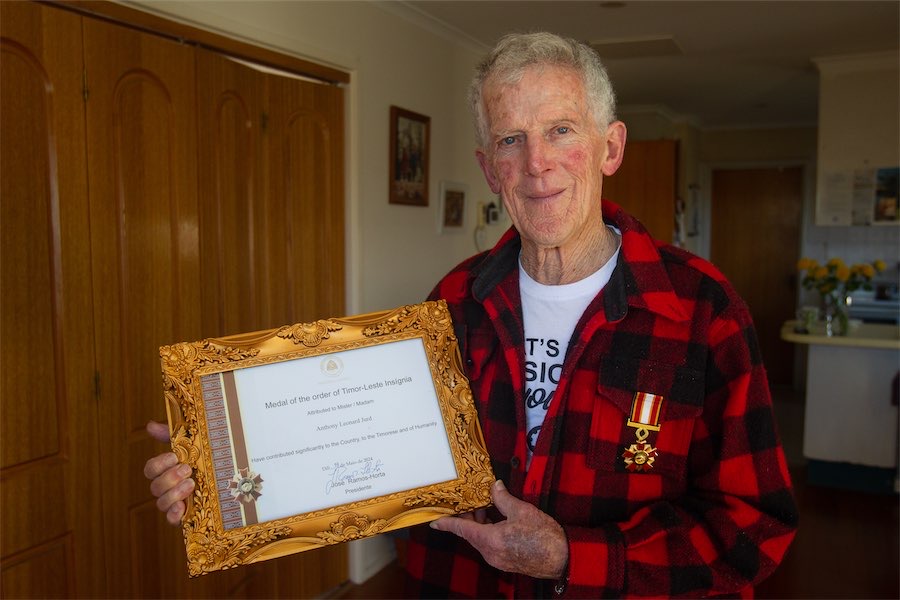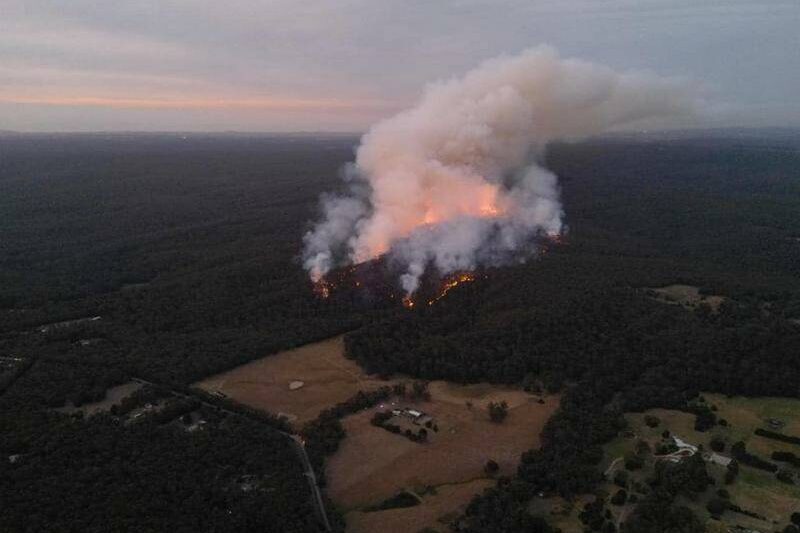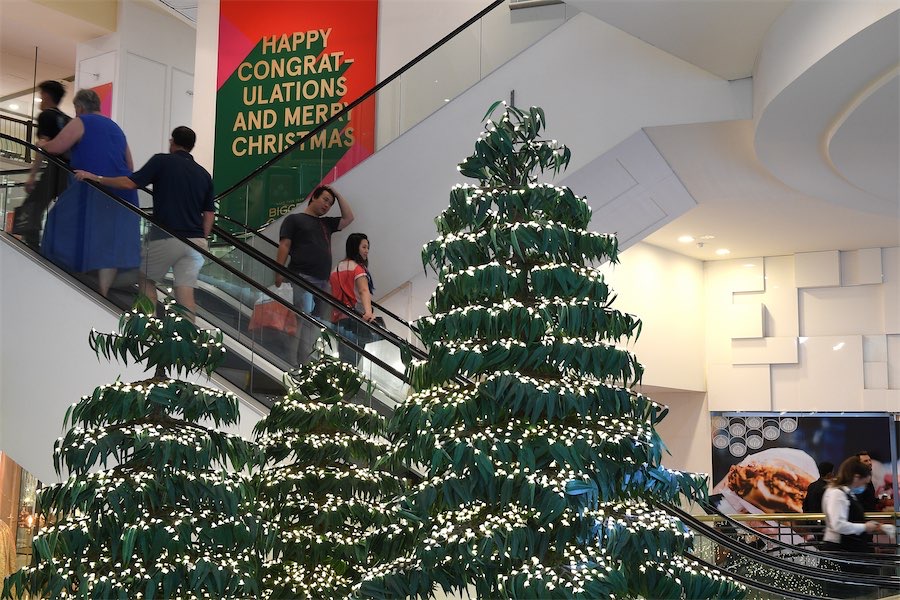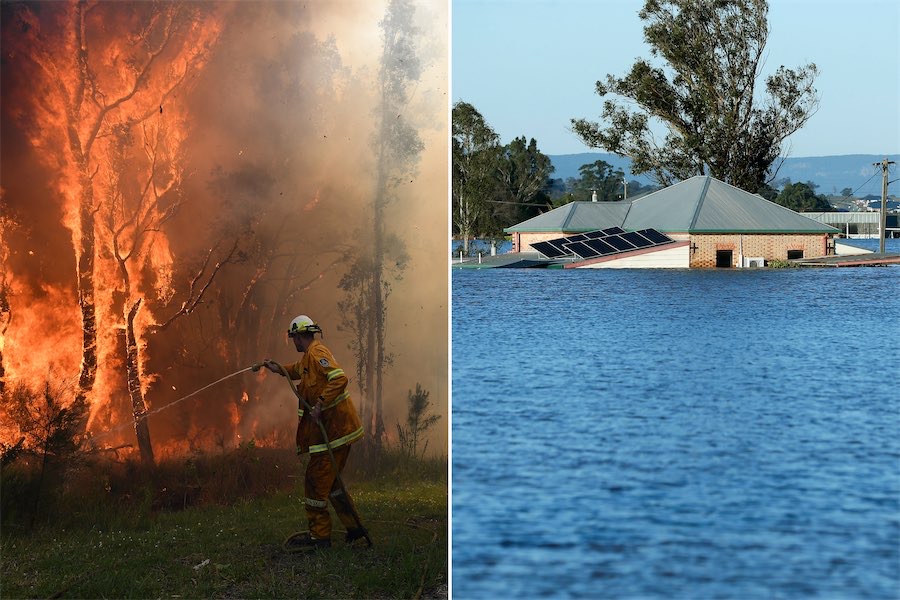
Holder resident Tony Jurd was looking through emails when he came across a notice that he had been honoured with the Medal of the Order of Timor-Leste.
Dismissing it as a scam, 79-year-old Tony says he carried on with his day, until he got a call asking whether he and his wife, Rose, would be attending the ceremony in Dili. And so they did, in mid-July.
While extremely proud, Tony says he felt a mixture of emotions, and questioned why he specifically was being honoured.
“I knew so many other activists, and I didn’t think I was, you know, hanging shoulders above them,” he says.
“I found [out] one or two of them had the award, and then it triggered me into delving into my memories of who else was involved, and the circumstances, what the Timorese suffered over their 24 years of military occupation by Indonesia.
“They lost something close to a third of their population.”
The Indonesian military invaded East Timor on December 7 1975 under the pretext of anti-colonialism and anti-communism to overthrow the popular Fretilin regime that had emerged in 1974.
Tony’s connection to East Timor goes back 50 years, when he and Rose were on their honeymoon, backpacking to Europe.
He says their first stop was East Timor, as the cheapest flight out of Australia at the time was Darwin to Dili.
“We never made it to Europe,” he says.
“We got stuck in southeast Asia… 18 months later we were still in India.”
Tony says East Timor didn’t leave any more of an impression than the other southeast Asian countries they spent time in, other than it was a place of happy, welcoming people.
“As soon as the military invasion started, it triggered my social conscience, I guess, my Christian values,” Tony says.
“That sort of sparked a lot of things, anger and frustration and puzzlement and feeling helpless, and the injustice of it.”
In the wake of the invasion, Tony and other like-minded Canberrans began campaigning for an independent East Timor, participating in meetings, starting a weekly radio program on 2XX, and putting up an information table in Civic every Saturday.
“The Timorese from Melbourne and Sydney used to come by busloads to protest at the Australian Parliament, the Indonesian embassy, the National Conference of Labour and the Coalition, in every possible way, to voice their need for the military to be out of [East] Timor and for them to have a chance of independence” he says.
Campaigning was difficult, as there were hurdles to sourcing reliable news about the conflict. Tony says the Australian government was even “clamping down” on two-way radio contact between Australia and East Timor, under the guise of the radios not being properly licensed.
“There were a lot of Australians [who] were persuaded by the government that [because] Indonesia was a big, important neighbour, it was important not to have a break of relations,” he says.
“But that was at the cost of closing our eyes to what was happening.”
According to the Commission for Reception, Truth and Reconciliation in East Timor, anywhere between 90,800 and 202,600 died during Indonesia’s 24-year occupation.
From 1999 until East Timor’s independence in May 2002, the country was under the administration of the UN, who oversaw the election of the Constituent Assembly, the implementation of a constitution, and a historic ballot, where 78.5 per cent of the East Timorese population voted in favour of independence.
“Rose and I went back in 2001, and [our] Timor friends, knowing that I work in technology and radio and TV, requested me to come and teach,” Tony says.
“I’ve been over there annually to teach since then.”
They couldn’t have asked for a better teacher, with Tony having worked at the Apollo moon landing mission tracking stations, and as head of the audiovisual technical support team at ANU for 20 years, along with another 20 years running his own satellite and cable TV installation business.
During his visits, which usually go for two to three months, Tony says he works at a vocational high school in collaboration with the Salesians of Don Bosco, a Catholic congregation that runs schools, orphanages, and training centres all around the world.
“It’s a boarding school, so I live-in with them whenever I’m there,” he says.
“They inspire me, and they seem to think I’ve got something to offer.”
Tony still is very much active in advocacy work for East Timor, through the organisation Canberra Friends of Dili, and says he will be back in East Timor again in September and October, just like every year.
Who can be trusted?
In a world of spin and confusion, there’s never been a more important time to support independent journalism in Canberra.
If you trust our work online and want to enforce the power of independent voices, I invite you to make a small contribution.
Every dollar of support is invested back into our journalism to help keep citynews.com.au strong and free.
Thank you,
Ian Meikle, editor




Leave a Reply